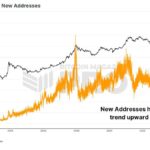As Ripple and the U.S. Securities and Exchange Commission (SEC) persist in their legal dispute over XRP’s classification as a security, the consequences for both parties and the wider cryptocurrency market cannot be understated. This case offers a unique opportunity to attain much-needed regulatory clarity, which could ultimately promote growth and stability throughout the sector. Ripple should embrace this prospect wholeheartedly.
The following opinion editorial was written by Joseph Collement, General Counsel at Bitcoin.com.
Recent events, such as a rise in XRP’s value and an increase in open interest in the futures market, indicate mounting optimism about Ripple’s chances of triumphing in its lawsuit against the SEC. This positive sentiment is fueled by the anticipation that a Ripple victory could solidify XRP’s legal status in the U.S. market, prompting further price surges and potentially sparking an “alt season” where alternative cryptocurrencies outperform Bitcoin and Ethereum.
But what does a win truly mean for Ripple? Examining the potential outcomes and their implications is crucial to understanding the importance of securing a favorable court judgment.
Confidential Settlement
The SEC and Ripple could reach a private settlement agreement. In this scenario, the terms of the settlement remain undisclosed, and the case does not proceed. While this outcome may offer some respite for Ripple, it is unlikely to provide guidance or clarification regarding the regulatory status of XRP and similar tokens.
Public Settlement
The SEC and Ripple could reach a settlement agreement that is disclosed publicly. This typically involves the company agreeing to pay a fine, register the token as a security, or adhere to specific regulatory requirements. If XRP were to be registered as a security, it could have wide-ranging repercussions for Ripple and the broader industry, as the classification would likely impede the token’s adoption and hamper innovation in the field.
SEC Drops the Case
Although improbable and a significant victory for Ripple, this result could occur if the SEC determines that it lacks sufficient proof to substantiate its allegations or if it decides that pursuing the case is not in the public interest. This outcome would certainly be a major win for Ripple. However, it would not provide clarity on whether similar tokens are securities, leaving the industry in a state of ambiguity and possibly deterring newcomers.
Ruling that XRP is not a Security
If the court rules in favor of Ripple, it could determine that XRP is not a security. This outcome would establish a legal precedent for the industry, strengthening the legitimacy of XRP and other similar tokens. A win for Ripple would also deal a significant blow to the SEC’s systematic attempt to claim jurisdiction over crypto assets. However, it is important to note that such a ruling may be subject to appeals, extending the legal battle and creating further uncertainty.
Ruling in Favor of the SEC
This outcome determines that XRP is a security in the U.S. and will embolden the SEC to continue its regulatory crusade against crypto assets, further impeding the industry’s growth.
While a settlement may alleviate Ripple’s risk of an unfavorable ruling, given Ripple’s chances of winning its lawsuit as inferred by the market, the company should rise to the challenge and seize the opportunity to shape the future of the cryptocurrency industry. Obtaining a favorable judgment, especially with a published opinion from the court, will establish a legal precedent, offer desperately-needed clarity on token classifications, demonstrate Ripple’s commitment to industry principles, solidify XRP’s long-term legitimacy, and influence global regulatory approaches. The entire industry is watching, and Ripple has the potential to leave a lasting impact on the world of crypto.
What outcome do you think is most likely in the ongoing legal battle between Ripple and the SEC, and how do you believe it will impact the wider cryptocurrency market and the future of token classification?









